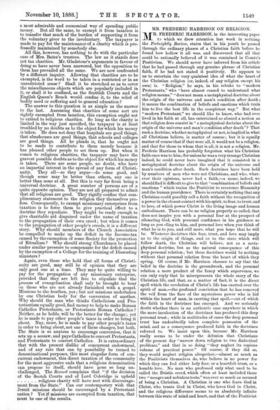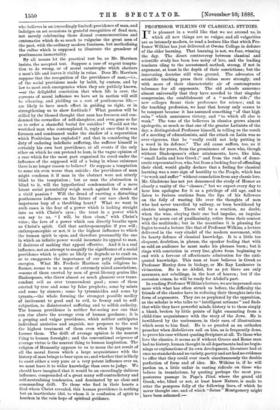MR. FREDERIC HARRISON ON RELIGION.
MR. FREDERIC HARRISON, in the interesting paper which we drew attention last week in noticing the Fortnightly Review, states that in his youth he passed through the orainary phases of a Christian faith before he found how hollow it all was, and discovered that all that could be rationally believed of it was contained in Comte's Positivism. We should never have inferred from his article that he had passed through any genuine phrase of Christian faith, if he had not stated it positively. He appears to us to entertain the very quaintest idea of what the heart of the Christian religion (or, indeed, of any religion except his own) is. "Religion," he says, in his rebuke to "modern Protestants," who "have almost ceased to understand what religion means," "does not mean a metaphysical doctrine about the origin of the universe and man's condition after death; it means the combination of beliefs and emotions which train him to live the best life in the completest way." But what "modern Protestant," we should like to know, who had ever lived in his faith at all, has entertained so absurd a notion as that religion does consist in " a metaphysical doctrine about the origin of the universe and man's condition after death"? That such a doctrine, whether metaphysical or not, is implied in what all Christians believe, is matter of course ; but it is equally matter of course that if that were all, it would not be a religion, and that for those to whom that is all, it is not a religion. Mr. Frederic Harrison has probably forgotten what his Christian faith once was to him; for unless he was a very strange Christian indeed, he could never have imagined that it consisted in a metaphysical doctrine about the origin of the universe and man's condition after death. Such doctrines have been held by numbers of men who were not Christians, and who, what- ever their opinions, never had a faith,—a name, indeed, we shouldfind it difficult to give to that "combination of beliefs and emotions " which trains the Positivist to reverence Humanity and the human providence. There is certainly nothing that any Christian could possibly call a faith without the recognition of a power in the closest contact with his spirit, to fear, to trust, and to love, of which power Christ is the living image and human embodiment. There can be no religion properly so called, that does not inspire you with a personal fear at the prospect of alienating God, with personal confidence in his guidance so long as you cling to him, and personal love when you think of what he is to you, and still more, what you hope that he will be. Whatever doctrines this fear, trust, and love may imply as to the origin of things, and as to the state which will follow death, the Christian will believe, not as a meta- physical doctrine, but as the natural consequence of this deep personal relation ; but these doctrines would be nothing without that personal relation from the heart of which they spring. Of course, if Mr. Harrison chooses to say that the belief in the doctrine is the groundwork, and the personal relation a mere product of the fancy which supervenes, we can only reply that he misrepresents the whole story of the Christian life, and that, as a matter of fact, it is the direct spell which the revelation of Christ's life has exerted over the spirit of man,—the profound conviction that he has removed the veil from the face of the mysterious power who is hid within the heart of man, in exerting that spell,—out of which the faith in the doctrines has emerged. And we seriously doubt whether there is an authentic case anywhere in which the mere inculcation of the doctrines has produced this deep
personal trust ; while in multitudes of cases the deep personal trust has undoubtedly taken complete possession of the mind, and as a consequence produced faith in the doctrines referred to. We insist upon this, because Mr. Harrison really seems to be under the delusion that Christians of the present day "narrow down religion to two dialectical problems," and that in so doing "they neglect its copious volume of practical power." Of course, if they did so, they would neglect religion altogether,—almost as much as the Positivists themselves do, who believe in no power for which they can feel either holy fear, or a heartfelt trust, or a humble love. No man who professed only what used to be called the Deistic creed, which often at least included these two "meagre and nebulous tests," was ever so much as accused of being a Christian. A Christian is one who fears God in Christ, who trusts God in Christ, who loves God in Christ, and the religious difference seems to us absolutely infinite between this state of mind and heart, and that of the Positivist
who believes in an (exceedingly limited) providence of man, and indulges on set occasions in grateful recognition of dead men,
not merely celebrating those dismal commemorations and centenaries which do so much to vulgarise the great men of the past, with theordinsry modern fussiness, but methodising the craw which is supposed to illustrate the grandeur of posthumous immortality.
By all means let the practical test be, as Mr. Harrison insists, the accepted test. Suppose a case of urgent tempta- tion to do wrong, or of moral catastrophe which shatters a man's life and leaves it visibly in ruins. Does Mr. Harrison suppose that the recognition of the providence of man,—i.e., of the social provisions made by habit, by custom, and by law to meet such emergencies when they are publicly known, —or the delightful conviction that when life is over, the currents of moral influence we have• set in motion will still be vibrating, and yielding us a sort of posthumous life,— are likely to have much effect in guiding us right, or in strengthening us to show fortitude ? What passion will be stilled by the blessed thought that man has foreseen and con- demned the cowardice of self-slaughter, and even gone so far as to order a shameful burial for suicides ? Would not the wretched man who contemplated it, reply at once that it was foreseen and condemned under the shadow of a superstition which Positivism has exploded P and that in considering the duty of enduring indefinite suffering, the sufferer himself is certainly his own best providence, at all events if the only other on which he can pretend to lean, is the vague opinion of a race which for the most part organised its creed under the influence of the supposed will of a being in whose existence there is no longer reason to believe ? Or suppose a temptation to some sin even worse than suicide : the providence of man might condemn it if man in the abstract were not utterly blind to the temptation ; but as man the abstraction is blind to it, will the hypothetical condemnation of a mere latent social potentiality weigh much against the strain of a vivid passion ? Will the dread of exerting a disturbing posthumous influence on the future of our race check the impetuous leap of a throbbing heart ? What we want in such cases is the fear of a power which is looking straight into us with Christ's eyes ; the trust in a power which can say to us, "I will, be thou clean," with Christ's voice; the love of a power which can directly breathe upon us Christ's spirit. Call that anthropomorphic if you will ; anthropomorphic or not, it is the highest influence to which the human spirit is open, and therefore presumably the one in which an infinite power would incarnate its appeal to man, if desirous of making that appeal effective. And it is a real influence, not an attempt to magnify the significance of a social providence which is quite as likely to degrade as to exalt us, or to exaggerate the importance of our petty posthumous energies. What Mr. Frederic Harrison calls religious in- fluence, seems to us a mass of extremely mixed associations, —some of them exerted by men of great literary genius like Shakespeare, who threw almost as much glamour over trans- cendent evil as over transcendent good ; some of them exerted by true and some by false prophets; some by saints and some by sinners ; some by tyrannieides and some by tyrants,—the whole forming the strongest possible medley of incitement to good and to evil, to frenzy and to self- subjection, to disinterested suffering and to selfish audacity. The human providence is neither far-seeing nor one that can rise above the average even of human goodness ; it is a groping and vulgar providence, which neither anticipates individual anxieties and anguish, nor proposes to the soul the highest treatment of them even when it happens to foresee them. The drift of average opinion is the nearest ning to human foresight ; and the conventional exigeance of average virtue is the nearest thing to human inspiration. The religion of Humanity appears to us to mean the net result of all the moral forces which a large acquaintance with the history of man brings to bear upon us; and whether that is likely to exert either a very pure or a very potent influence over us, we must leave it to wider knowledge than ours to judge. We should have imagined that it would be an exceedingly dubious influence, compounded of a great many self-contradictory and self-neutralising tendencies, and dominated by no clear and commanding drift. To those who find in their hearts a God whom Christ revealed, this human providence is nothing but an inarticulate idol, to whom it is confusion of spirit to hearken in the vain hope of spiritual guidance.







































 Previous page
Previous page